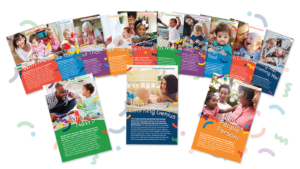Excellent educators are intentional.
To help develop your skills, consider our current offering of ZERO TO THREE Critical Competencies for Infant-Toddler Educators™


The Critical Competencies trainings can have a positive effect on how early childhood educators perceive their own work, and how their work is perceived by others. We spoke with Lorena Rodriguez, a ZERO TO THREE Critical Competencies Certified Trainer and Faculty for the Critical Competencies, about what changes she’s observed while delivering the trainings.
 I’m currently in Central Oregon. I’ve been in Oregon for five years now, and prior to that I was in California working under the child welfare system. I worked with Child Protective Services, emergency response, reunification, and then finally adoption. I decided to move to Oregon for a calmer quality of life. I worked with the child abuse hotline here, and helped when it transferred over to a 24/7 model (which wasn’t the case initially).
I’m currently in Central Oregon. I’ve been in Oregon for five years now, and prior to that I was in California working under the child welfare system. I worked with Child Protective Services, emergency response, reunification, and then finally adoption. I decided to move to Oregon for a calmer quality of life. I worked with the child abuse hotline here, and helped when it transferred over to a 24/7 model (which wasn’t the case initially).
I started working as an infant-toddler specialist for a nonprofit organization called Neighbor Impact, and there I was able to support early educators with continuous quality improvement within their classrooms. I supported them with resources for behaviors that might be a little bit stronger than what they’re used to, helped support family connections, and really just elevated them as professionals in their field so they’re not seen as just daycare workers or babysitters. I emphasized, “You’re professionals — you’re educators and you are impacting the lives of children in ways that you may not even know.”
From there I moved to a position at Oregon State University as a mentor coach. I transitioned over to the training side of our organization, which is Early Learning System Initiative, or ELSI for short, and it’s housed within Oregon State University. Now I create trainings for childhood educators based on the needs assessments of what is missing, what is needed, and what areas need to be elevated more for the continuous quality improvement for educators.
So that was in 2019, right before the pandemic, as part of my infant-toddler role when I was at the nonprofit. All the infant-toddler specialists were required to take the ZERO TO THREE Critical Competencies. We were in-person for a while and then our final module, in March or April 2020, was virtual. That was how I was first introduced to the Critical Competencies. Along with that, I helped a little bit with providing feedback on the Spanish translation, since we didn’t have that before. Oregon decided that if they were able to use the licensing, they’d translate it for ZERO TO THREE. I’ve been delivering the training in English and Spanish ever since 2019 and renewing my certification every year.
With the pandemic, educators were feeling very overwhelmed with everything that they had to do. The training was a requirement for them to receive some of the state funding. So, initially they said, “We don’t have the time. I don’t need this training. I know how to take care of infants and toddlers.” I started backwards with the content. I did the smaller module first and then went to the biggest just to ease our educators into it. After that first session, it was refreshing for them to see what they already knew brought into a new light and connected to the research and brain science. Because for the longest time, providers weren’t being told that there’s so much happening cognitively with the little ones.
Educators were saying, “Can I share this with my parents? They can see that we’re doing more than just taking care of their children. We’re doing colors. We’re doing cognitive things. We’re doing social emotional learning.” They saw it as a way to show parents what’s going on behind the scenes in the classroom. It really supported them in advocating a bit more for the work that they do. They could show how they were doing language and literacy, and how their work would support children for kindergarten, because that’s mostly what all the parents.
The ZERO TO THREE Critical Competencies really provided that beginning foundation and explained it in such a way that it was easy to connect to families. In Oregon, our state’s Quality Recognition and Improvement System (QRIS) is known as Spark. And family engagement is a crucial part of Spark — programs can be rated three-star, four-star, or five-star. It’s getting revamped right now, but one part of that was family engagement, and a lot of the educators realized that they’re already elevating that area and doing more for family engagement just by getting more buy-in from the parents. So, it helped a lot with that.
Excellent educators are intentional.
To help develop your skills, consider our current offering of ZERO TO THREE Critical Competencies for Infant-Toddler Educators™

Oh yes, definitely. When we started going into the content and the videos, there was this moment of, “Oh, I’m already doing all of this, and it’s very validating that I’m already doing this, and now I have a name for it. Now I have more research to back up why I’m doing what I’m doing.” I think it really sent the message that our educators are professionals and that they’re the experts in this field, which is something that’s missing from many early child care programs. The Critical Competencies really allowed educators to see themselves as much more than just “daycare providers.”
I think what I really, really like about the Critical Competencies curriculum is that it’s not saying to an educator that you’re doing it all wrong and now you have to do everything completely differently. It’s saying that you’re probably already doing all these things in these simple moments and simple interactions with children. We’re just going to tell you why it’s more important. You might already know why it’s important, but we’re giving you more tools for your toolkit to explain to others why it’s so important.
Tools for Parent Engagement: Critical Connections Leaflets
Each leaflet outlines a parent-child interaction that can positively impact child development.
